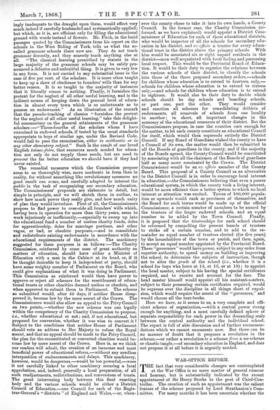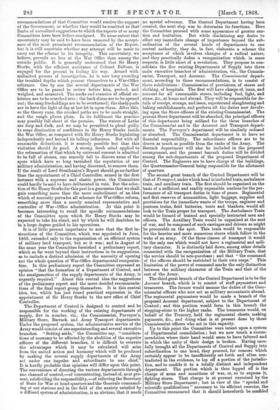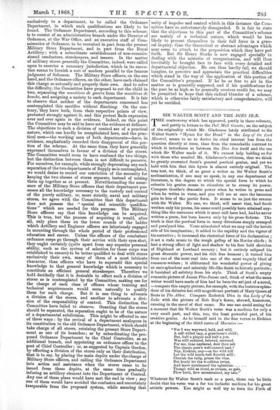WAR-OFFICE REFORM.
THE fact that very considerable changes are contemplated at the War Office is no mere matter of general rumour and hearsay, but is substantially indicated by the recent appointment of Sir Henry Storks to the post of Chief-Con- troller. The creation of such an appointment was the salient feature of the scheme proposed by Lord Strathnairn's Com- mittee. For many months it has been uncertain whether the recommendations of that Committee would receive the support I of the Government, or whether they would be remitted to that'l limbo of unrealized suggestions to which the reports of so many Committees have been before consigned. To some extent that uncertainty may be said to have been removed by the accept- ance of the most prominent recommendation of the Report, but it is still uncertain whether any attempt will be made to carry out the scheme in its integrity. This uncertainty, we believe, prevails no less at the War Office than among the outside public. It is generally understood that Sir Henry Storks, with the efficient assistance of Colonel Balfour, is engaged for the present in feeling his way. Armed with unlimited powers of investigation, he is now busy sounding the troubled depths which present themselves to a War-Office reformer. One by one the several departments of the War Office are to be passed in review before him, probed, and weighed, and measured. The nooks and crannies of official ex- istence are to be searched into ; the back slums are to be opened out; the snug freeholdings are to be overturned; the shady pools are to have the light of day at last let in upon them. After this, so the theory runs, the crooked paths are to be made straight, and the rough places plain. In its fulfilment the practice may possibly fall short of the promise. The waters of Lathe are deep and dark, and we may be permitted to plead guilty to some diminution of confidence in Sir Henry Storks inside the War Office, as compared with Sir Henry Storks legislating independently and beyond its lulling influences. But with all reasonable deductions, it is scarcely possible but that this visitation should do good. A strong, fresh mind applied to the reformation of that which by universal consent is admitted to be full of abuses, can scarcely fail to discern some of the spots which have so long tarnished the reputation of our military administration, and having discerned, to remove them. If the result of Lord StratIonairn's Report should go no further than the appointment of a Chief Controller, armed in the first instance with a supreme and elastic power, the Committee -could hardly be said to have deliberated in vain. But the selec- tion of Sir Henry Storks for this post is a guarantee that we shall gain something more than the mere embodiment of an idea -which of necessity pervades all schemes for War-Office reform, 7.comething more than a merely nominal representative and -controller of War - Office administration. At this point it becomes interesting to recall the specific recommendations of the Committee upon which Sir Henry Storks may be -expected to take his stand, and by which he will doubtless be in a large degree guided in his operations.
It is of little present importance to note that the first in- structions of the Committee, which was appointed in June, 1866, extended only to the organization of an efficient system of military land transport, but so it was ; and in August of the same year the Committee furnished a preliminary report, which so far went beyond their instructions in its suggestions, -as to include a distinct admission of the necessity of opening out the whole question of War-Office departmental reorganiza- tion. In this preliminary report the Committee expressed an opinion "that the formation of a Department of Control, and the amalgamation of the supply departments of the Army, is urgently required." About this central idea the suggestions of the preliminary report and the more decided recommenda- tions of the final report group themselves. It is this central idea, too, which has just found practical expression in the appointment of Sir Henry Storks to the new office of Chief Controller.
The Department of Control is designed to control and be responsible for the working of the existing departments of • supply, five in number, viz., the Commissariat, Purveyor's, Military Store, Barrack, and Army Transport departments. Under the proposed system, the administrative service of the Army would consist of one superintending and several executive branches. "Setting aside," the Committee say, "considera- tions of economy to be effected by the abolition of the superior officers of the different branches, it is difficult to overrate the advantages which it may be calculated will arise from the united action and harmony which will be produced by making the several supply departments of the Army act under one impulse and subordinate to one chief." It is hardly probable that opinions will differ upon this point. The convenience of directing the various departments through one channel of control,—of concentrating, instead of, as at pre- sent, subdividing the responsibility,—of relieving the Secretary of State for War at head-quarters and the Generals command- ing at out stations and in the field of the anxiety entailed by a diffused system of administration, is so obvious, that it needs
no special advocacy. The Control Department having been created, the next step was to determine its functions. Here the Committee proceed with some appearance of greater cau- tion and hesitation. But while disclaiming any desire to effect any immediate change of importance beyond the sub- ordination of the several heads of departments to one central authority, they do, in fact, elaborate a scheme the acceptance of which involves changes of a radical nature, and they practically define a reorganization which, in some respects, is little short of a revolution. They propose to con- solidate the five existing Departments of Supply into three main executive branches of administration, viz., the Commis- sariat, Transport, and Account. The Commissariat depart- ment, according to these recommendations, is to consist of three subdivisions : Commissaries of provisions, of stores and clothing, of hospitals. The first will have charge of, issue, and account for all consumable stores, including fuel, light, and straw, &c., at home and abroad. They will be responsible for de- tails of receipt, storage, and issue, superintend slaughtering and baking establishments, and. perform all the duties now devolv- ing upon the Store officers of the existing Commissariat. The present Store department will be absorbed, the principal officers of this department being utilized for the three branches of the Commissariat and in the Account and Transport depart- ments. The Purveyor's department will be similarly reduced or absorbed. The Commissariat department is to have no financial responsibility. The subordinate officers are to be drawn as much as possible from the ranks of the Army. The Barrack department will also be included in the proposed arrangement, and the present barrack duties will be divided among the sub-departments of the proposed Department of Control. The Engineers are to have charge of the buildings, the Quartermaster-General being responsible for the allotment of quarters.
The second great branch of the Control Department will be that of Transport, under which head is included train, ambulance train, and auxiliary train. The first should be organized on the basis of a sufficient and readily expansible nucleus for the per- formance of all transport duties in time of peace. Regimental and first reserves of ammunition, light baggage, supplies and provisions for the immediate wants of the troops, engineer and pontoon trains, field batteries, tents and blankets, would-all look to the Train proper for transport. The Ambulance Train would be formed of trained and specially instructed men and officers. The Auxiliary Train would be organized at the seat of war, and be composed of such carriages and drivers as might be procurable on the spot. This train would be responsible for the heavier and more numerous stores which follow in the wake of an army. Of the three classes of transport it would be the only one which would not have a regimental and mili- tary character. It is distinctly laid down, among other details
connected with the reorganization of the Military Train, that the service should be non-purchase ; and that "the command of the officers should be restricted to their own corps." This limitation of the power of command marks the only distinction between the military character of the Train and that of the rest of the Army.
The third great branch of the Control Department is to be the Account branch, which is to consist of staff paymasters and treasurers. The former would assume the duties of the Com- missariat officers who now act as military accountants abroad.
The regimental paymasters would be made a branch of the proposed Account department, subject to the Department of Control ; and this position would form in this branch the stepping-stone to the higher ranks. The treasurers would, on behalf of the Treasury, hold the regimental chests, making payments, &c., and doing what is at present done by those Commissariat officers who act in this capacity. Up to this point the Committee were intent upon a system of Departmental consolidation ; but we now touch a recom- mendation where their hand would seem to have faltered and in which the unity of their design is broken. Having care- fully brought all the Departments of Control and Supply into subordination to one head, they proceed, for reasons which certainly appear to be insufficiently set forth and often con- tradicted in the evidence, to lop off a portion of the jurisdic- tion, and to confide it to a totally distinct and independent department. The portion which is thus lopped off is the charge of arms and munitions of war, or, so to express it, fighting stores. That charge is at present exercised by the Military Store Department ; but in view of the "special and scientific qualifications" necessary to its efficient exercise, the Committee recommend that it should henceforth be confided exclusively to a department, to be called the Ordnance Department, in which such qualifications are likely to be found. The Ordnance Department, according to this scheme, is to consist of an administrative branch under the Director of Ordnance, at the War Office, and an'executive staff of Com- missaries of Ordnance, to be recruited in part from the present Military Store Department, and in part from the Royal Artillery ; with a subordinate establishment of non-commis- sioned conductors, storekeepers, and issuers. In the matter of military stores generally the Committee, indeed, were called upon to exercise a summary jurisdiction, which in its execu- tion seems to furnish a sort of modern parallel to the famous judgment of Solomon. The Military Store officers, on the one hand, and the Ordnance officers, on the other, have each claimed this charge as naturally and properly their own. And to solve the difficulty, the Committee have proposed to cut the child in two, separating the munitions de guerre from the munitions de bottche, and assigning a moiety to each department. It is fair to observe that neither of the departments concerned has contemplated this sacrifice without flinching. On the con- trary:they have both, from their respective points of view, protested strongly against it, and this protest finds expression over and over again in the evidence. Indeed, on this point the Committee may be said to have set the evidence at defiance. The objections to such a division of control are of a practical nature, which can hardly be recapitulated here, and the prac- tical men—the working men of both departments—have, in evidence, emphatically recorded their disapproval of this por- tion of the scheme. At the same time, they have generally 'expressed themselves in favour of a division of the stores. The Committee would seem to have confused the two things, but the distinction between them is not difficult to perceive. For ourselves, for example, while strongly deprecating any such separation of the two departments of Supply as is contemplated, we would desire to record our conviction of the necessity for keeping the two classes of stores separate, instead of mixing them up together as at present. Notwithstanding the assur- ance of the Military Store officers that their department pos- sesses all the knowledge necessary to the custody and control -of the purely military, or, more strictly, naval and military stores, we agree with the Committee that this department does not possess the "special and scientific qualifica- tions" which are needed for this purpose. The Military Store officers Bay that this knowledge can be acquired. This is true, but the process of acquiring it would, after all, only place them on the lower rounds of the ladder which Artillery and Engineer officers are laboriously engaged in mounting through the whole period of their professional education and career. Unless the officers of the combatant ordnance corps go through their service with their eyes shut, they ought certainly (quite apart from any superior personal ability, such as the system of selection for these corps was 'established to ensure) to be better qualified to deal with stores -exclusively their own, many of them of a most intricate -character, than officers who have to superadd this special knowledge to that general knowledge which is necessary to -constitute an efficient general storekeeper. Therefore we hold decidedly that it is desirable to effect such a division of stores as is contemplated by the Committee, making use for the charge of each class of officers whose training and technical acquirements would seem naturally to qualify them for such charge. But it is one thing to advocate a division of the stores, and another to advocate a divi- sion of the responsibility of control. This distinction the Committee have failed to observe. Granting that the stores should be separated, the separation ought to be of the nature -of a departmental subdivision. This might be effected in one -of three ways : by the revival of a department analogous in its constitution to the old Ordnance Department, which should take charge of all stores, retaining the present Store Depart- ment as one of its branches ; or by subordinating the pro- posed Ordnance Department to the Chief Controller, as an additional branch, and appointing an ordnance officer to the post of Chief Controller ; or, as suggested by Captain Gordon, by effecting a division of the stores only on their distribution, that is to say, by placing the main depots under the charge of Military Store officers, and calling the Ordnance Department into action and assistance when the stores came to be issued from these depots, at the same time gradually infusing an artillery element into the Department of Control. Any one of these plans would have met the end in view ; any one of them would have avoided the confusion and uncertainty inseparable from the proposed system, while assuring that unity of impulse and control which in this instance the Com- mittee have so unfortunately disregarded. It is fair to state that the objections to this part of the Committee's scheme are mainly of a technical nature, which would be less likely to present themselves in their full force in a gene- ral inquiry, than the theoretical or abstract advantages which may seem to attach to the proposition which they have put forth. But Sir Henry Storks is now engaged specially in dealing with the minuthe of reorganization, and will thus inevitably be brought face to face with every detailed and departmental objection. He can thus hardly fail, we should imagine, to perceive and appreciate the practical difficulties which stand in the way of the application of this portion of the Committee's proposal. If he be as free to act in the matter as is generally supposed, and if his qualifications for the post be as high as he generally receives credit for, we may be permitted to hope that this radical blunder of a scheme, which is otherwise fairly satisfactory and comprehensive, will yet be rectified.




































 Previous page
Previous page